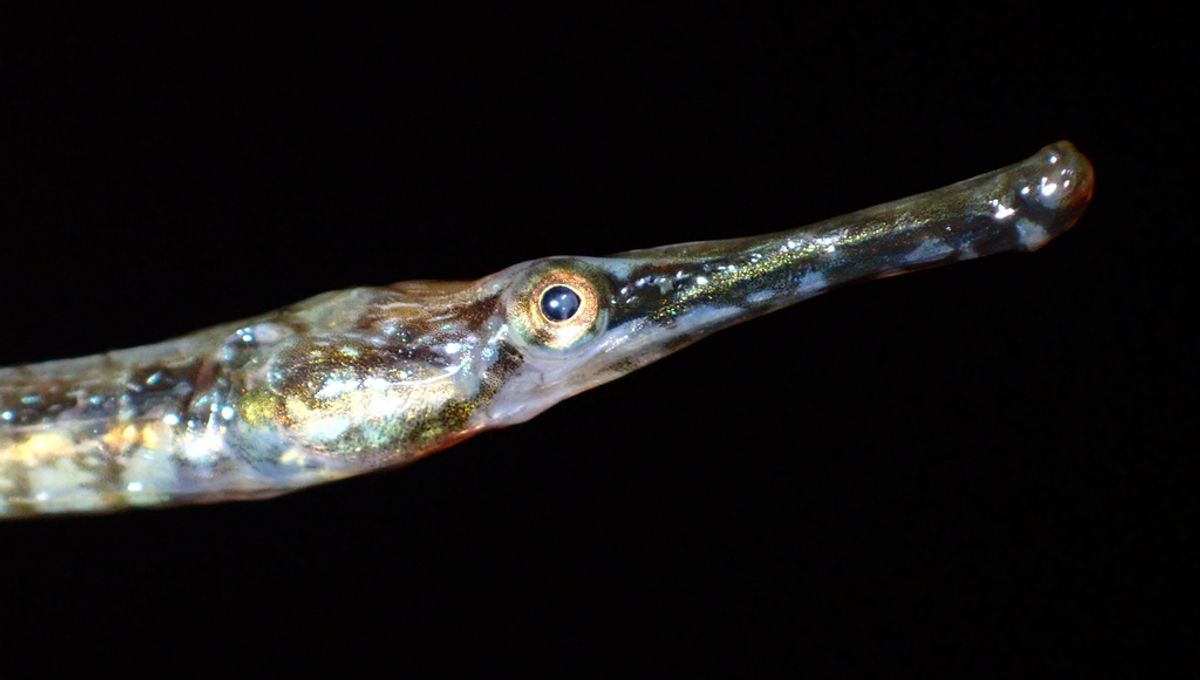
In the animal kingdom, it is often the case that males are bigger, louder, and more visually impressive to look at. All this posturing shows off how fit they are to a prospective mate and might lead to better chances of breeding. However, in the world of the dusky pipefish, it is actually the smaller males that are in with much more of a chance – they just have to carry the pregnancy too.
Dusky pipefish (Syngnathus floridae) have a breeding season where the males and females try to get with as many potential mates as possible. The pipefish’s brood pouch can even contain eggs from multiple females. Dusky pipefish lack sexual dimorphism, which means the males and the females look the same, known as monomorphism – but just because the males and females look the same does not mean that a certain trait within the population won’t catch the eye of a female. Like seahorses, pipefish males carry the pregnancy, so male fitness is important to a female pipefish as he needs to be fit to carry her eggs.
“Pipefish are unique because they don’t follow the usual ‘rules’ of evolution. In most species, males compete to attract females. But with pipefish, the males carry and protect the embryos,” Te Whare Wānanga o Waitaha | University of Canterbury (UC) PhD student and paper co-author Nicole Tosto, whose work led to this discovery, said in a statement.
Since there are no outwardly visible differences between the male and female pipefish, the team decided to see if selection pressures were at play within pipefish genes. Pipefish were collected from Tampa Bay seagrass beds to establish breeding populations – all the pipefish were implanted with fluorescent tags so the similar-looking individuals could be recognized.
Researchers analyzed the mating successes of the pipefish and also used RNA sequencing on the gonads, liver, and gills to see if there were differences in the gene expression in these areas. The livers were chosen because they play a “key role in egg and sperm production in fish,” write the authors in the paper.
Interestingly, pipefish do not have sex chromosomes and males and females have the same genetics – instead, the males and females activate their genes in different ways. The team found that the male pipefish activate genes that produce proteins that strengthen their immune systems. This is beneficial for carrying the eggs and helping them develop inside a brood pouch makes them vulnerable to infections. On the female side, genes are activated that help support the production of the eggs.
The females were found to prefer smaller males – which, while unusual in terms of the animal world, fits with their unique ecology. It is thought that the smaller males might require fewer resources and might even be better at performing the complex synchronized movements involved in their courtship rituals. However, the researchers note that this is “surprising as evidence from studies on wild S. floridae shows that larger males often had both a higher reproductive success and higher mating success compared to smaller males,” and suggest that this “may reflect a true pattern from this population of S. floridae […] or it may be an artefact resulting from housing the pipefish in the lab.”
The information is not just interesting on a biological level, it could even help inform how conservation strategies could work. “Knowing how these pressures shape mating systems helps us better understand how species survive and adapt to their environments,” concluded Tosto.
The paper is published in the journal Molecular Ecology.
Source Link: For Dusky Pipefish, Males Get Pregnant And Sex Chromosomes Don't Exist